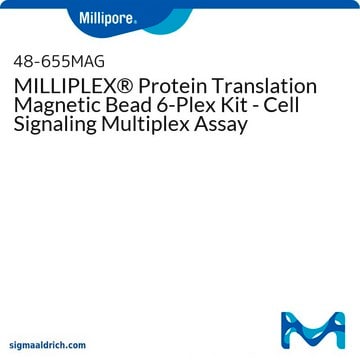CKT1MAG-97K
MILLIPLEX® Canine Kidney Toxicity Expanded Magnetic Bead Panel 1, CKT1MAG-97K
The analytes available for this multiplex kit are: Clusterin, Cystatin C, Kidney Injury Molecule-1 (KIM-1), IL-8, Lipocalin-2/NGAL, MCP-1, Osteopontin (OPN).
About This Item
Recommended Products
Quality Level
species reactivity
canine
manufacturer/tradename
Milliplex®
assay range
accuracy: 89-107%
sensitivity: 0.005-0.630 ng/mL
(All other analytes; MinDC +2SD)
sensitivity: 0.670 pg/mL
(KIM-1; MinDC +2SD)
standard curve range: 0.01-10 ng/mL
(Cystatin C)
standard curve range: 0.01-10 ng/mL
(Osteopontin)
standard curve range: 0.03-20 ng/mL
(Lipocalin-2/NGAL)
standard curve range: 0.07-50 ng/mL
(IL-8)
standard curve range: 0.07-50 ng/mL
(MCP-1)
standard curve range: 1.0-700 pg/mL
(KIM-1)
standard curve range: 1.4-1,000 ng/mL
(Clusterin)
technique(s)
multiplexing: suitable
detection method
fluorometric (Luminex xMAP)
shipped in
wet ice
General description
The MILLIPLEX® Canine Kidney Toxicity Expanded Panel 1 is to be used for the simultaneous quantification of the following 7 analytes in any combination in canine urine samples: Clusterin, Cystatin C, Kidney Injury Molecule-1 (KIM-1), IL-8, Lipocalin-2/NGAL, MCP-1, and Osteopontin (OPN). This kit uses a 96-well format, contains a lyophilized standard cocktail, two internal assay quality controls while can measure up to 38 samples in duplicate.
The Luminex® xMAP® platform uses a magnetic bead immunoassay format for ideal speed and sensitivity to quantitate multiple analytes simultaneously, dramatically improving productivity while conserving valuable sample volume.
Panel Type: Toxicity
Application
- Analytes: Clusterin, Cystatin C, Kidney Injury Molecule-1 (KIM-1), IL-8, Lipocalin-2/NGAL, MCP-1, Osteopontin (OPN)
- Recommended Sample Type: Canine urine
- Recommended Sample Dilution: 25 μL of 1:2 diluted urine for normal subjects; optimal dilutions for disease subjects should be determined
- Assay Run Time: Primary incubation of 2 hours, followed by a secondary incubation of 1 hour, both at room temperature (20-25°C)
- Research Category: Toxicology
Features and Benefits
Other Notes
Legal Information
Signal Word
Danger
Hazard Statements
Precautionary Statements
Hazard Classifications
Acute Tox. 3 Dermal - Acute Tox. 4 Inhalation - Acute Tox. 4 Oral - Aquatic Chronic 2 - Eye Dam. 1 - Skin Sens. 1 - STOT RE 2
Target Organs
Respiratory Tract
Storage Class Code
6.1C - Combustible acute toxic Cat.3 / toxic compounds or compounds which causing chronic effects
Certificates of Analysis (COA)
Search for Certificates of Analysis (COA) by entering the products Lot/Batch Number. Lot and Batch Numbers can be found on a product’s label following the words ‘Lot’ or ‘Batch’.
Already Own This Product?
Find documentation for the products that you have recently purchased in the Document Library.
Related Content
Novel kidney toxicity biomarkers expand options for acute nephrotoxicity detection. Multiplex assays measure multiple renal damage biomarkers in small sample volumes, minimizing time and costs. See how MILLIPLEX® multiplex kidney toxicity assays detected vancomycin-induced subacute nephrotoxicity in rat models.
Novel kidney toxicity biomarkers expand options for acute nephrotoxicity detection. Multiplex assays measure multiple renal damage biomarkers in small sample volumes, minimizing time and costs. See how MILLIPLEX® multiplex kidney toxicity assays detected vancomycin-induced subacute nephrotoxicity in rat models.
Novel kidney toxicity biomarkers expand options for acute nephrotoxicity detection. Multiplex assays measure multiple renal damage biomarkers in small sample volumes, minimizing time and costs. See how MILLIPLEX® multiplex kidney toxicity assays detected vancomycin-induced subacute nephrotoxicity in rat models.
Novel kidney toxicity biomarkers expand options for acute nephrotoxicity detection. Multiplex assays measure multiple renal damage biomarkers in small sample volumes, minimizing time and costs. See how MILLIPLEX® multiplex kidney toxicity assays detected vancomycin-induced subacute nephrotoxicity in rat models.
Our team of scientists has experience in all areas of research including Life Science, Material Science, Chemical Synthesis, Chromatography, Analytical and many others.
Contact Technical Service










